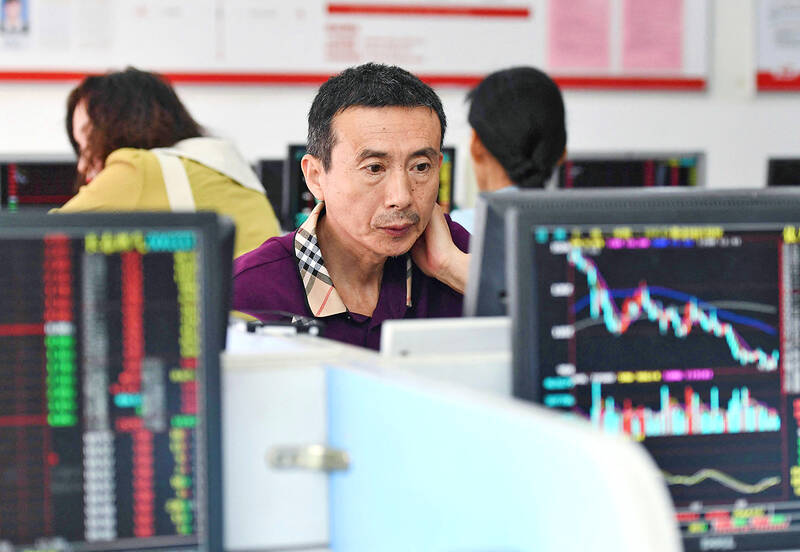Many Chinese are venting their frustration at China’s slowing economy and weak stock markets in an unconventional place: the social media account of the US embassy in Beijing.
A post on Friday on protecting wild giraffes by the US embassy on Weibo (微博), a Chinese platform similar to X, has attracted 130,000 comments and 15,000 reposts as of yesterday, many of them unrelated to wildlife conservation.
“Could you spare us some missiles to bomb away the Shanghai Stock Exchange?” one user wrote in a repost of the article.

Photo: AFP
The Weibo account of the US embassy in China “has become the Wailing Wall of Chinese retail equity investors,” another user wrote.
The US embassy did not immediately respond to a Reuters request for comment.
While Weibo users can publish individual posts about the market and the economy, Chinese authorities regularly block what they view as “negative” online comments when they gain traction.
The commenting function on posts related to the economy or the markets on social media platforms can also be turned off or only show selected comments, restricting channels in which people can express their opinions.
China’s blue-chip CSI300 Index tumbled 6.3 percent last month, plumbing five-year lows after a raft of government support measures failed to prop up confidence dented by multiple economic headwinds, including a multi-year property slump, tepid domestic consumption and deflationary pressures.
Late last month, Chinese state media reported that China would take more “forceful” measures to support market confidence following a Cabinet meeting chaired by Chinese Premier Li Qiang (李強).
Chinese authorities have since ramped up efforts to calm investors, sending out positive messages that sometimes produce the opposite effect.
On Friday, the official People’s Daily published an article with the headline: “The entire country is filled with optimism.”
The headline was soon mocked on Chinese social media.
A Weibo user, in a repost of the US embassy’s giraffe protection article, wrote: “The entire giraffe community is filled with optimism.”

ADVERSARIES: The new list includes 11 entities in China and one in Taiwan, which is a local branch of Chinese cloud computing firm Inspur Group The US added dozens of entities to a trade blacklist on Tuesday, the US Department of Commerce said, in part to disrupt Beijing’s artificial intelligence (AI) and advanced computing capabilities. The action affects 80 entities from countries including China, the United Arab Emirates and Iran, with the commerce department citing their “activities contrary to US national security and foreign policy.” Those added to the “entity list” are restricted from obtaining US items and technologies without government authorization. “We will not allow adversaries to exploit American technology to bolster their own militaries and threaten American lives,” US Secretary of Commerce Howard Lutnick said. The entities

‘SWASTICAR’: Tesla CEO Elon Musk’s close association with Donald Trump has prompted opponents to brand him a ‘Nazi’ and resulted in a dramatic drop in sales Demonstrators descended on Tesla Inc dealerships across the US, and in Europe and Canada on Saturday to protest company chief Elon Musk, who has amassed extraordinary power as a top adviser to US President Donald Trump. Waving signs with messages such as “Musk is stealing our money” and “Reclaim our country,” the protests largely took place peacefully following fiery episodes of vandalism on Tesla vehicles, dealerships and other facilities in recent weeks that US officials have denounced as terrorism. Hundreds rallied on Saturday outside the Tesla dealership in Manhattan. Some blasted Musk, the world’s richest man, while others demanded the shuttering of his

Minister of Finance Chuang Tsui-yun (莊翠雲) yesterday told lawmakers that she “would not speculate,” but a “response plan” has been prepared in case Taiwan is targeted by US President Donald Trump’s reciprocal tariffs, which are to be announced on Wednesday next week. The Trump administration, including US Secretary of the Treasury Scott Bessent, has said that much of the proposed reciprocal tariffs would focus on the 15 countries that have the highest trade surpluses with the US. Bessent has referred to those countries as the “dirty 15,” but has not named them. Last year, Taiwan’s US$73.9 billion trade surplus with the US

Prices of gasoline and diesel products at domestic gas stations are to fall NT$0.2 and NT$0.1 per liter respectively this week, even though international crude oil prices rose last week, CPC Corp, Taiwan (台灣中油) and Formosa Petrochemical Corp (台塑石化) said yesterday. International crude oil prices continued rising last week, as the US Energy Information Administration reported a larger-than-expected drop in US commercial crude oil inventories, CPC said in a statement. Based on the company’s floating oil price formula, the cost of crude oil rose 2.38 percent last week from a week earlier, it said. News that US President Donald Trump plans a “secondary